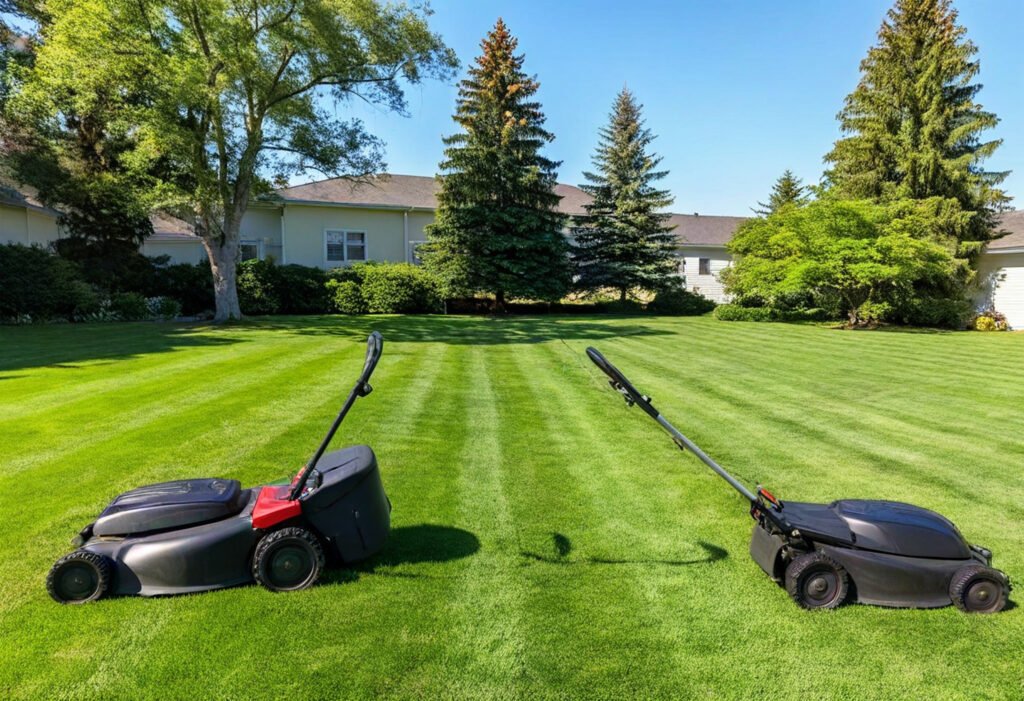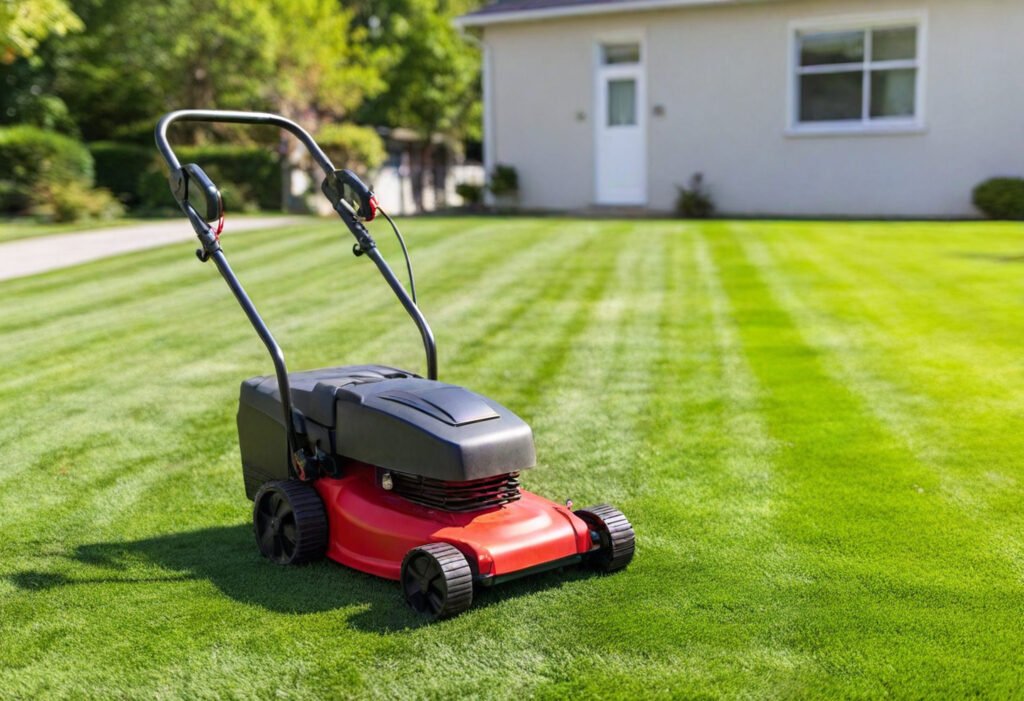Picking between an electric vs gas lawn mower can be tough, especially since landscaping adds up to 5% of air pollution in the US each year. My research shows that a gas mower running for just one hour puts out the same emissions as a car driving 100 miles.
You need to think over your specific needs before choosing between gas and electric mowers. A typical US lawn covers about 0.2 acres, and most electric mowers run 30 to 60 minutes on a single charge – that’s enough time to mow an average yard. But are electric lawnmowers better than gas for everyone? Not really. Your choice between electric and gas models depends on your yard size, maintenance priorities, and how much you care about the environment. Tests prove that all-electric mowers are quieter than gas models, which makes a big difference to your neighbors.
What Sets Electric and Gas Lawn Mowers Apart
The main difference between electric and gas lawnmowers lies in their power source. Electric and Gas Lawn Mowers run on batteries or direct electrical connections, while gas mowers need unleaded gasoline. This affects how they perform and how people use them.
Power source and energy efficiency
Electric mowers use rechargeable lithium-ion batteries that last 30-60 minutes on a single charge. These mowers turn more energy into mechanical power than gas models, which makes them better at using energy. Battery-powered mowers can handle areas up to 1.125 acres per charge, but they need recharging after that.
Gas mowers can keep running as long as you add fuel, which makes them better for bigger properties. A regular gas mower runs for 1-2 hours on a full tank and cuts about 14,000 square feet (about a third of an acre) before needing more fuel. These mowers use more resources, though – a typical push mower needs about 2/3 gallon of gas to mow half an acre.
Maintenance needs and upkeep
Gas mowers need regular oil changes, new air filters, spark plug checks, and clean carburetors. You also have to drain the remaining fuel when the mowing season ends to keep the engine in good shape.
Electric and Gas Lawn Mowers just need sharp blades and some cleaning now and then. They’re easier to maintain because they don’t have as many moving parts as gas engines. Most of the upkeep involves taking care of the battery and charging it properly.
Initial cost vs. long-term savings
Electric mowers cost between USD 100-500, and many good models cost more than gas ones. Gas mowers usually sell for USD 150-800, making them cheaper to buy at first.
The yearly costs tell a different story, though. Electric mowers use about USD 108 worth of electricity for the same job, and would need USD 3,200 in gas for gas mowers. Even with new batteries every 3-5 years at USD 142 for a 40V battery, electric models save you money over time.
Noise and emissions comparison
Gas mowers are loud at 90-100 decibels, and can hurt your ears after just an hour without protection. Electric models only make 65-75 decibels of noise, about as loud as a normal conversation, and 20dB quieter than gas mowers.
Gas mowers pollute quite a bit – running one for an hour creates as much pollution as driving an SUV 23,500 miles. Electric mowers make zero direct emissions, though their total environmental impact depends on where the charging electricity comes from.
Performance Showdown: Real Test Results

Recent tests of both mower types reveal surprising differences in how these competing technologies perform.
Cutting evenness and quality
Complete testing shows gas mowers slightly outperform electric models with a 4.7 average cutting score compared to 4.5. Gas mowers maintained consistency with their lowest score at 3.5. Electric models showed more variation between 3.8 and 5. High-end electric models match their gas counterparts in delivering a carpet-like finish.
Side discharging and mulching
Both types achieve similar results in side discharge performance with “very good” average ratings. Mulching capabilities show minimal differences. Gas mowers score 4.7 while electric models follow closely at 4.6. Technology advances have bridged the performance gap in this area.
Bagging capacity and efficiency
Both technologies demonstrate comparable bagging efficiency. Top gas models reach 4.6 points, while electric models peak at 4.5. Most models fall within the “good” range. Electric models score between 2.3-4.5, and gas models range from 2.7 to 4.6.
Handling and maneuverability
Electric mowers excel in handling, with a 4.2 average score compared to gas mowers’ 3.8. Their lighter weight and accessible controls make them easier to navigate through tight spaces.
Battery life vs. fuel tank duration
Electric mowers run 30-60 minutes per charge, which suits small to medium lawns well. Gas models last longer, running 1-2 hours per tank. This makes them better choices for larger properties that need uninterrupted mowing.
Noise levels at user and neighbor distances
Noise testing reveals the biggest difference between these technologies. Electric mowers score an impressive 5.0 at the user’s ear, while gas models manage only 2.2. The gap grows at 25 feet (neighbor distance) with electric models scoring 5.3 versus gas models’ 2.8. Gas mowers produce about 90 dB, exceeding the 85 dB hearing damage threshold. Electric models generate just 65-75 dB.
User Feedback: What Real Owners Are Saying
Real-life experiences tell us more than technical specifications. User feedback from both electric and gas lawn mower owners gives us practical insights about their daily use.
Ease of use and startup experience
Electric mower owners praise the push-button start feature because it eliminates the physical strain of pull-starting gas models. “I was mowing my lawn when my neighbor got his mail; he did not know I was mowing my yard. He could not hear it inside his house,” an electric mower owner shared. Users find electric models lighter and more maneuverable, which makes them perfect for yards with landscaping features.
Performance on different lawn sizes
Lawn size remains the key factor in choosing between electric and gas lawnmowers. A fully charged electric mower handles the typical quarter-acre American lawn without problems. Larger properties show mixed results from users. One owner explained: “I can mow my whole yard with the larger battery if it is not too tall, but if it is tall, I will also need one of the smaller batteries to finish”.
Handling wet or thick grass
Gas mowers excel in challenging conditions consistently. Users praise these models because they “cut through damp grass well” and make “easy work of mowing the edges of an overgrown field”. Electric mower users acknowledge their machines struggle with “very thick or tall grass”.
Battery replacement and charging concerns
Battery limitations remain the main concern for electric model users [link_1]. Modern batteries charge in under 1.5 hours, but replacement costs range from $100 to $300. Users need to replace batteries every 3-5 years, which increases long-term ownership costs.
Durability and reliability over time
Electric mowers serve 5-10 years with proper care, while gas models last 10-15 years or longer [link_2]. Gas mower owners choose these models because of their longevity. They point out that “all it takes is regular maintenance and caretaking for a gas-powered push mower to keep running season after season”.
Cost and Environmental Impact Compared

Lawn care’s financial equation goes way beyond the reach and influence of the initial price tag. A look at long-term ownership shows some unexpected differences between these competing technologies.
Upfront vs. lifetime cost breakdown
Electric mowers need a higher investment—typically USD 300-1000 for battery-powered walk-behind models, while gas mowers usually cost under USD 500. This relationship flips over time. The largest longitudinal study over five years reveals that electric models become more economical despite their premium price. Commercial users see an even bigger difference—electric mowers cost 3.5 to 5 times less than gas models over 10 years.
Fuel and Electric, and Gas Lawn Mowers usage
Operational costs show nowhere near the same numbers. A typical electric mower uses about 1000 watts per hour, which means just USD 108 yearly for work that would cost around USD 3200 in gasoline with a gas mower. Homeowners spend roughly USD 490 on fuel and maintenance over a decade with gas mowers, while electric alternatives cost only USD 191.
Carbon emissions and sustainability
Environmental differences paint an even clearer picture. One hour of gas lawn mower use creates pollutants equal to an SUV driven 23,500 miles. Gas-powered lawn equipment makes up about 5% of total greenhouse gas emissions in the United States. This is a big deal as it means that it exceeds aviation’s 2.5% share. Electric mowers create zero direct emissions and generate about 16 times less CO2 per acre mowed.
Battery production and disposal concerns
Electric options come with their environmental challenges. Lithium-ion batteries last 3-5 years before replacement and contain materials that can harm the environment without proper disposal. Battery recycling offers a solution by recovering valuable materials—lead-acid batteries see recycling rates of over 95%. The recycling process creates a closed-loop system where materials like lead, plastic, and acid make their way into new batteries. Proper disposal plays a vital role in reducing environmental impact.
Conclusion
Your specific needs and priorities will determine whether an electric or gas lawn mower works best for you. Electric mowers are easier to use, need less maintenance, run quieter, and don’t produce direct emissions. Gas mowers work better for bigger properties and wet conditions, and they last longer, too.
Electric models will save you more money in the long run. You’ll pay more upfront, but the money you save on fuel and maintenance over five years makes them cheaper overall. These mowers also help the environment since they don’t pollute like their gas-powered counterparts.
Modern electric and gas mowers now cut grass equally well. They both handle mulching and side discharge tasks effectively. Electric models are easier to handle and quieter, but they still have some drawbacks with battery life and tough grass conditions.
Our testing matches what most users say about these mowers. People love how electric mowers start with just a button press, move around easily, and run quietly. Gas mower owners praise their power to cut through thick grass and run for longer periods.
The right choice depends on your yard and how you plan to use it. Electric mowers work great for yards under half an acre, giving you good performance, convenience, and environmental benefits. Larger properties or challenging mowing conditions might need a gas mower’s power. The best mower is one that fits your needs and matches your priorities about cost, convenience, and environmental care.


No matter what I would choose electric. I switched many years ago and have not been sorry.